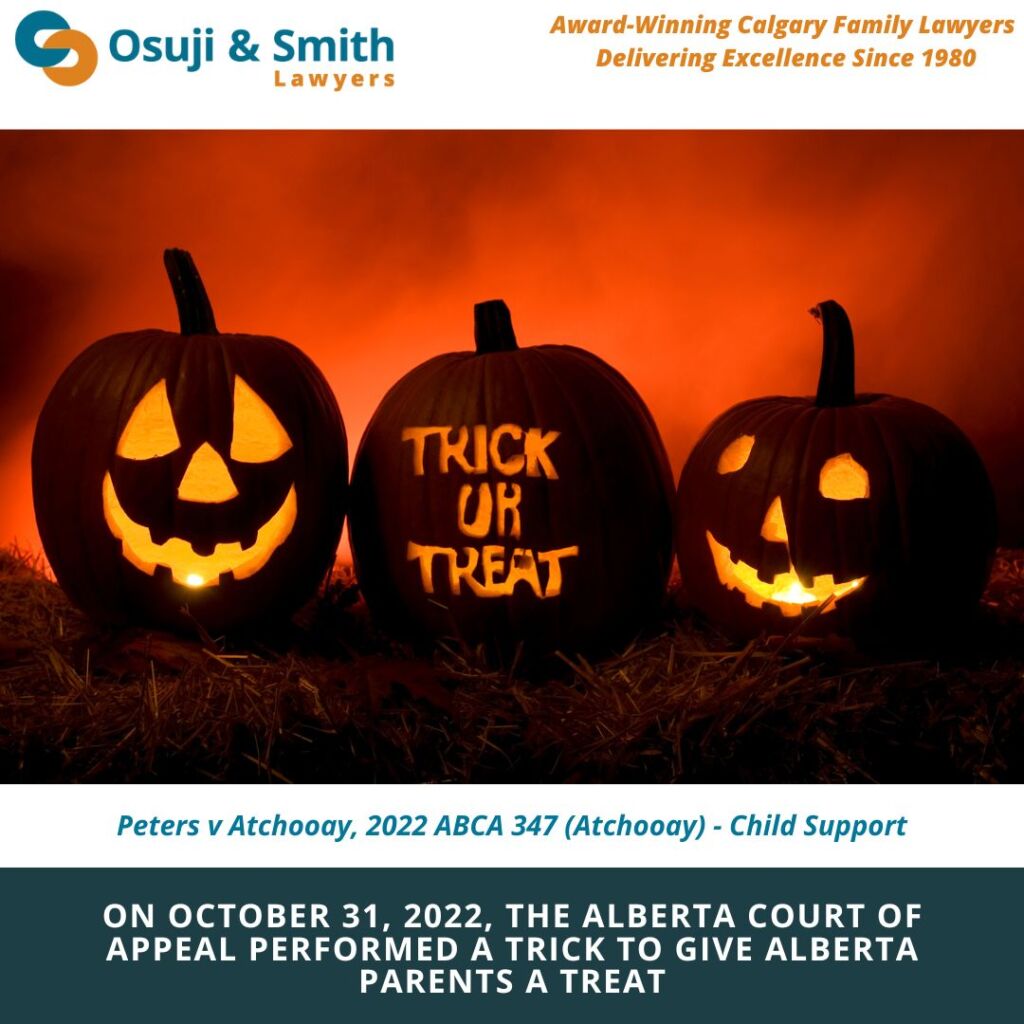Trick or Treat!
On October 31, 2022, the Alberta Court of Appeal performed a Trick to give Alberta parents a Treat.
Peters v Atchooay, 2022 ABCA 347 (Atchooay) involved parents of two children. The children lived with their mother, Ms. Peters, who took the role of stay-at-home mom. After 2013, the father, Mr. Atchooay, paid $1,250 in Child Support, with $22,534 in Child Support collected through enforcement. This still left about $122,000 in Child Support between 2014 and 2020.

So far, we hate this guy, right? But, honestly, Mr. Atchooay, like any other paying parent, should only be paying an amount of Child Support related to his income. Mr. Atchooay brought an Application in May 2020 to have his Child Support obligation changed so that he only has to pay $43,000. Still a lot of money that Ms. Peters could have used for the care of the children over those years, but not $122,000.
What happens here – which is actually very common among separated parents – is that a Court Order is made for Child Support, based on some information, but either the information changes (the parents’ incomes change) or they get more complete information (the deficient parent finally files a few years of tax returns). The parents in Atchooay did not exchange financial information for many years, and then Mr. Atchooay finally started getting his house in order, and tried to organize his Child Support obligation.
The original Child Support Order had set Mr. Atchooay’s income to $112,000. When Mr. Atchooay finally provided financial information, it showed that he has not made anywhere near that much since 2012. In 2014, he made about $75,000, and from then on, he made less than $45,000 in any year, including in 2019 where he reported no income at all.
The Trial judge agreed with the evidence Mr. Atchooay presented. The Court of Appeal did not.
The Trick and the Treat
The Trick that the Court of Appeal performed was to overrule itself, reversing a 21-year-old decision. Throughout the common law world (legal systems built off of England’s traditional system), a significant amount of law is filled in by courts looking at a dispute, deciding if any legal rule apply, and then either confirming that a previous rule does apply in that dispute’s case, or explaining how no rule really applies but that there is a close rule logically should apply. (If the last sentence was a little confusing, it is because I summarized a full year of law school into one sentence!)
Because those previous court decisions fill in the law that we all have to follow and live by, the decisions themselves are law, can be relied on in disputes, and need to be very steady. It is not nice having the rules of the game change on you; you were playing an excellent game of soccer, but then the other player just picks up the ball and runs past you! “Sorry, new rules.”
By overruling its own decision, the Court of Appeal performed an unusual Trick. To underline how unusual it is, the Court of Appeal usually decides cases with three judges; in Atchooay, five judges were assigned. All five judges put their support behind one clear decision. In the common law world, this is quite a Trick!
21 years ago, the Court of Appeal made a decision in Hunt v Smolis-Hunt, 2001 ABCA 229 (Smolis-Hunt). In that decision, the Court held that if a payer of Child Support did specifically intended to lower their income so that they did not have to pay as much Child Support, then the courts of Alberta would artificially set the income higher (this is called “imputing income”). Every other province in Canada came to a different conclusion: you did not have to prove that the payer had that specific intent, it was enough to show that through unreasonable or irresponsible decisions, the payer’s income was lowered.
Smolis-Hunt created many challenges and set Alberta apart from other provinces. Decide to deliver pizzas even though you have a software engineering degree? No evidence that delivering pizzas is to specifically lower your income for Child Support? Well, some courts would say, “Sorry, but this decision is enough evidence for me to decide you are trying to evade Child Support; I’m imputing”, and other courts would say, “This is bizarre, but I cannot conclude that this bizarre decision is specifically to evade Child Support; no imputing”.
The Treat was the reversal of Smolis-Hunt. Alberta’s unique position on Child Support law is now standardized. Alberta family law lawyers no longer have to argue about what was subjectively going through the payer’s mind; they only have to argue about how objectively reasonable the payer’s decision making has been.
Treat for Ms. Peters, Trick for Mr. Atchooay
Mr. Atchooay provided evidence that his annual income dropped. He did not provide much evidence as to why.
He had no other childcare responsibilities; the children in question were living with Ms. Peters, and Mr. Atchooay had no other children (that we know of). He made vague references to mental health and racial prejudice, but did not provide specific examples of receiving mental health diagnoses that would incapacitate him from working, and did not provide examples of bigotry affecting his job search because he provided no evidence of his job search.
As such, the Court of Appeal gave Ms. Peters a Treat: her appeal was entirely successful, and Mr. Atchooay still owes the same amount of Child Support as before. Now, Mr. Atchooay has to perform a Trick: getting his income back up, consolidating the debt from under supporting his two children, and hopefully move forward with his own life.
Happy (Belated) Halloween!
Author: David Miksha – Associate

